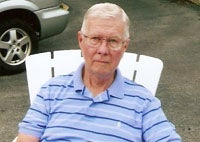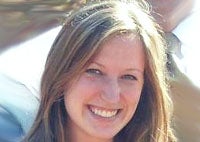A Student Perspective: Just Listen

Posted in GUMC Stories
 I knew it would happen sooner or later. I knew I would meet my grandfather.
I knew it would happen sooner or later. I knew I would meet my grandfather.
My grandfather passed away in June of 2010, several years after he was diagnosed with Parkinson’s disease. Everyone joked that my grandfather started a dynasty in Philadelphia. There was at least one Green in the vast majority of the schools in the Philadelphia area as I was growing up. He was truly an amazing man, who raised seven children with my equally admirable grandmother, earned a degree in electrical engineering as he was raising said children, and began his own business. I saw my grandfather often as I grew up, at our many family events. The mass gatherings of these hard workers inevitably were hilarious to behold, as we all also inherited the Green sense of humor and warm hospitality that must have accompanied our ancestors on the boat from Ireland after they decided potatoes weren’t cutting it for them.
My grandfather’s health slowly deteriorated, beginning around the time I graduated high school. When I decided to go to Notre Dame, a decision that entailed major sacrifices both on my part and on the part of my family, I knew my grandfather didn’t necessarily agree with the choice. None of us had ever left the Philadelphia area. And as the years passed, while I was away, he got sicker. Every time I came home, I saw the deficits. It became harder and harder for him to communicate. My parents filled him and my grandmother in on my life, and continued to do so as I went through my first year of medical school. When I decided to join the Air Force, I knew most of my family had reservations about it, but I hoped he was proud, as a former member of the Army. We rarely vocalize our feelings in my family and aren’t really a “touchy-feely” breed. At that point, he was very sick. At the end of my first year of medical school, I finally made it home to visit him in hospice. I wasn’t sure he recognized me, and he was in so much pain. A few days later, he died. The Air Force let me go to officer training a day late so I could speak at his funeral.
 The funeral was beautiful. The dynasty turned out in full force with its many supporters. I remember being fine until his 21-gun salute, and then feeling empty. I was about to get on a plane to go to Alabama and get reamed out constantly for my first 5 weeks in the military. I didn’t think I was strong enough for that. And then, as I sat in my family’s old minivan, with the door propped open to let in air, my grandfather finally let me know how he felt about me. One of his many friends came over to me. She only said two sentences. “Do you know how proud of you he was? He talked about you all the time.” I was speechless.
The funeral was beautiful. The dynasty turned out in full force with its many supporters. I remember being fine until his 21-gun salute, and then feeling empty. I was about to get on a plane to go to Alabama and get reamed out constantly for my first 5 weeks in the military. I didn’t think I was strong enough for that. And then, as I sat in my family’s old minivan, with the door propped open to let in air, my grandfather finally let me know how he felt about me. One of his many friends came over to me. She only said two sentences. “Do you know how proud of you he was? He talked about you all the time.” I was speechless.
When I say I knew I would meet my grandfather, I mean I knew I would meet a patient like him, with Parkinson’s disease. It happened on my Urology rotation. He was a consult patient with an elevated PSA. He wanted to decline a prostate biopsy based on recent debate in the national media about the value of PSA screening. He was simultaneously also trying to decide whether to proceed with deep brain stimulation, a relatively new option in the treatment regimen for Parkinson’s disease. He was very intelligent, and had done his reading and research. It was clear that his disease was starting to slow him down. He exhibited the Parkinson’s masked facies, rendering his face expressionless. His movements were stiff and jerky. His speech was slow and calculated.
Less than a minute into my history taking, I was fighting an urge to cry. I hadn’t even cried at my grandfather’s funeral. I knew exactly what this man was facing, and just how overwhelming all of these decisions were. I knew what the next few years had in store for him. The fact is, he was right about the PSA testing, in my opinion. His numbers were elevated, but the velocity of the change over the past several years was not enormous, and his life expectancy based on his comorbidities precluded a prostate cancer diagnosis from affecting his life very much, as it is typically slow-growing. It is ultimately the patient’s decision to proceed with more invasive testing that entails its own potential complications in addition to the possibility of definitive diagnosis, but he related that he had been given a hard time in the past for declining a biopsy at another institution. After telling me this, he was silent for awhile. Then he stammered, “That just didn’t sit well with me.”
I simply listened to him. I answered the few questions he did have sensitively, to the best of my ability, assuring him that the physician would continue the conversation. I implicitly gave him the affirmation he needed. I could tell it made all the difference. The physician agreed with my assessment, and we sent him on his way, at peace. Ultimately, we realized that the only reason he made that appointment was to feel that affirmation. He just wanted a medical professional to hear him out.
It’s easy to get caught up in getting things done quickly in this profession, but I will never forget that visit and how a few extra minutes sitting there with a patient, just letting him talk, made all the difference for him and his quality of life. I hope my grandfather’s physicians did the same for him. Most of all, I hope that I am developing into a doctor who would make my grandfather proud.
By Caroline Green (M’13), student at the Georgetown School of Medicine
(Published January 30, 2012)
